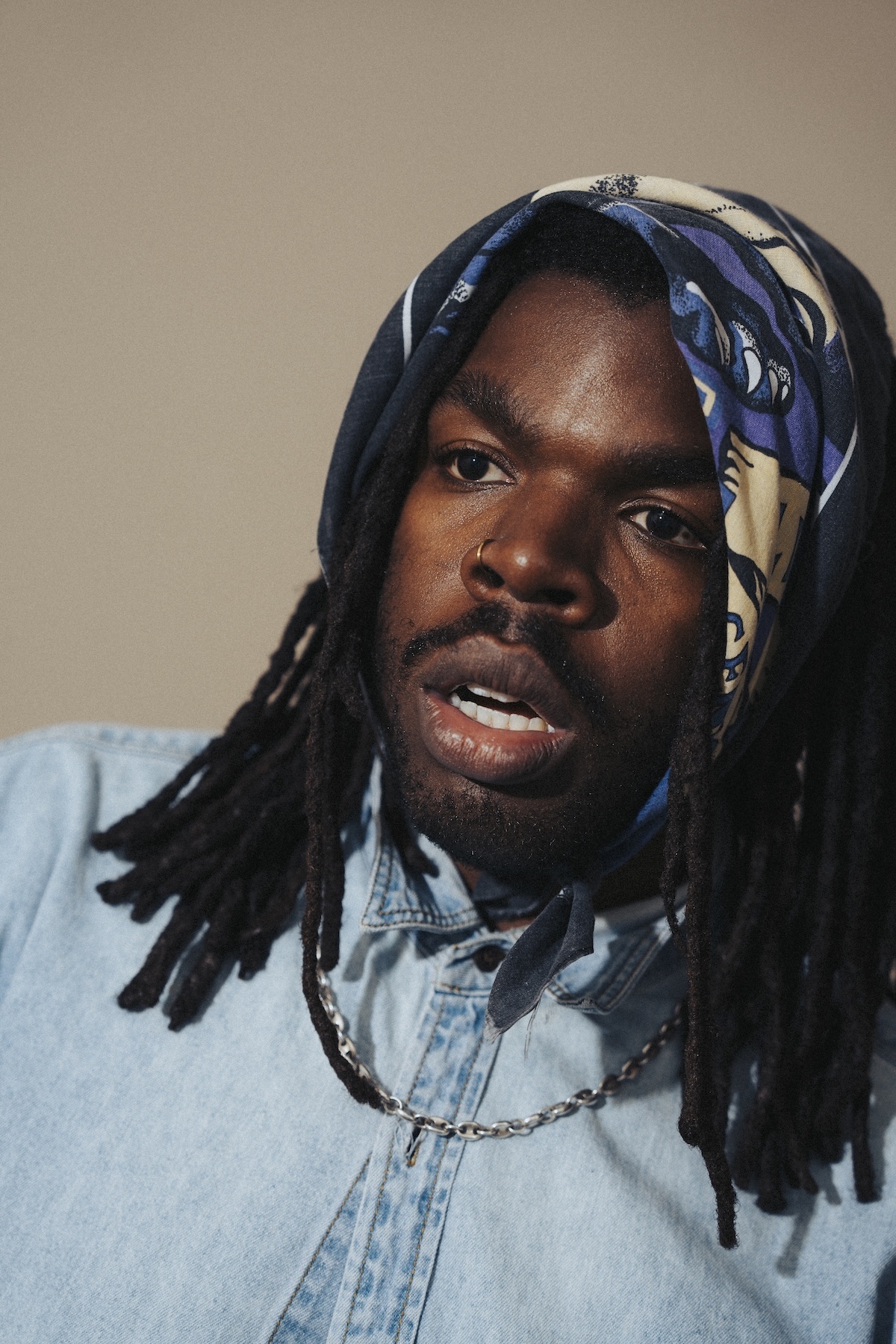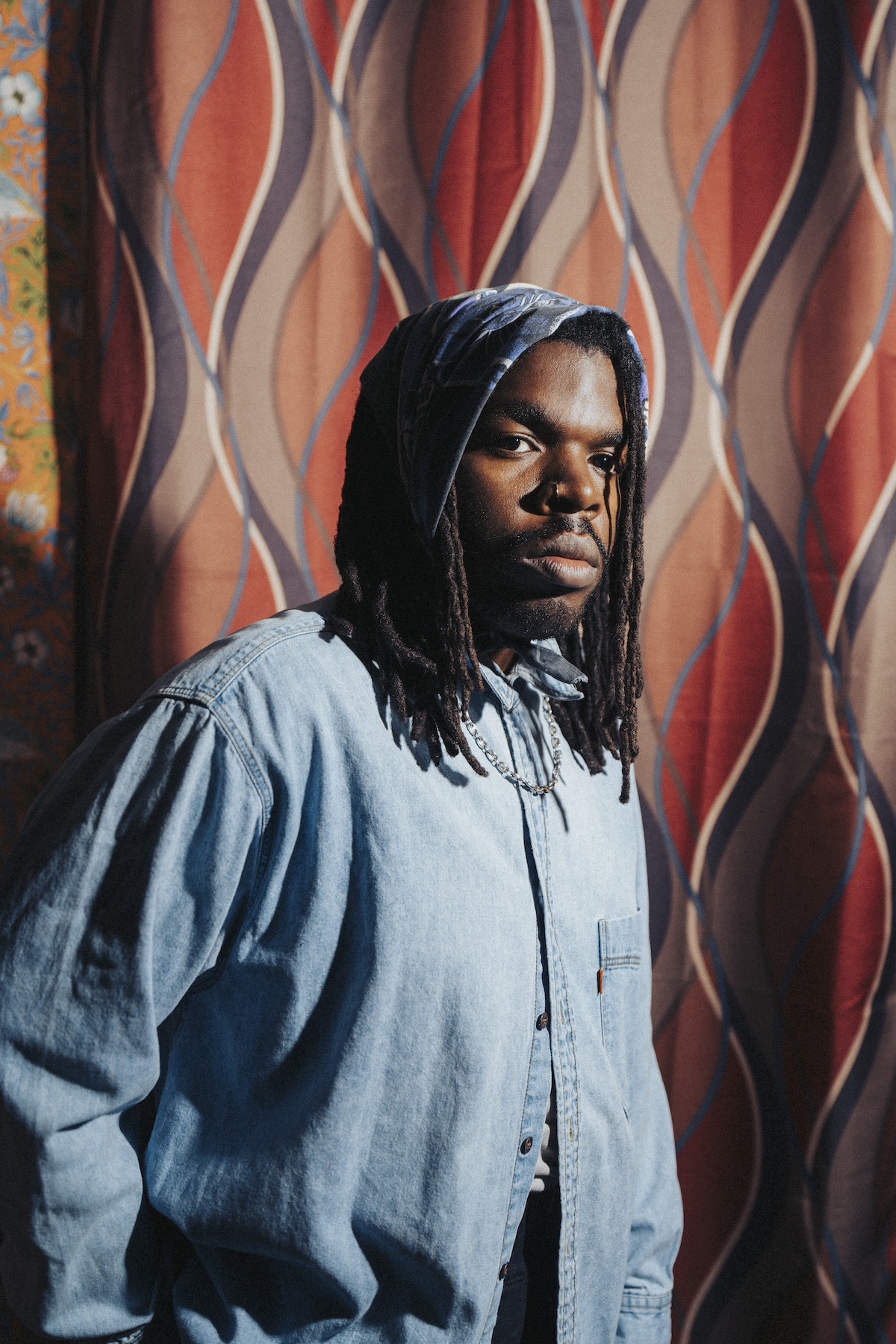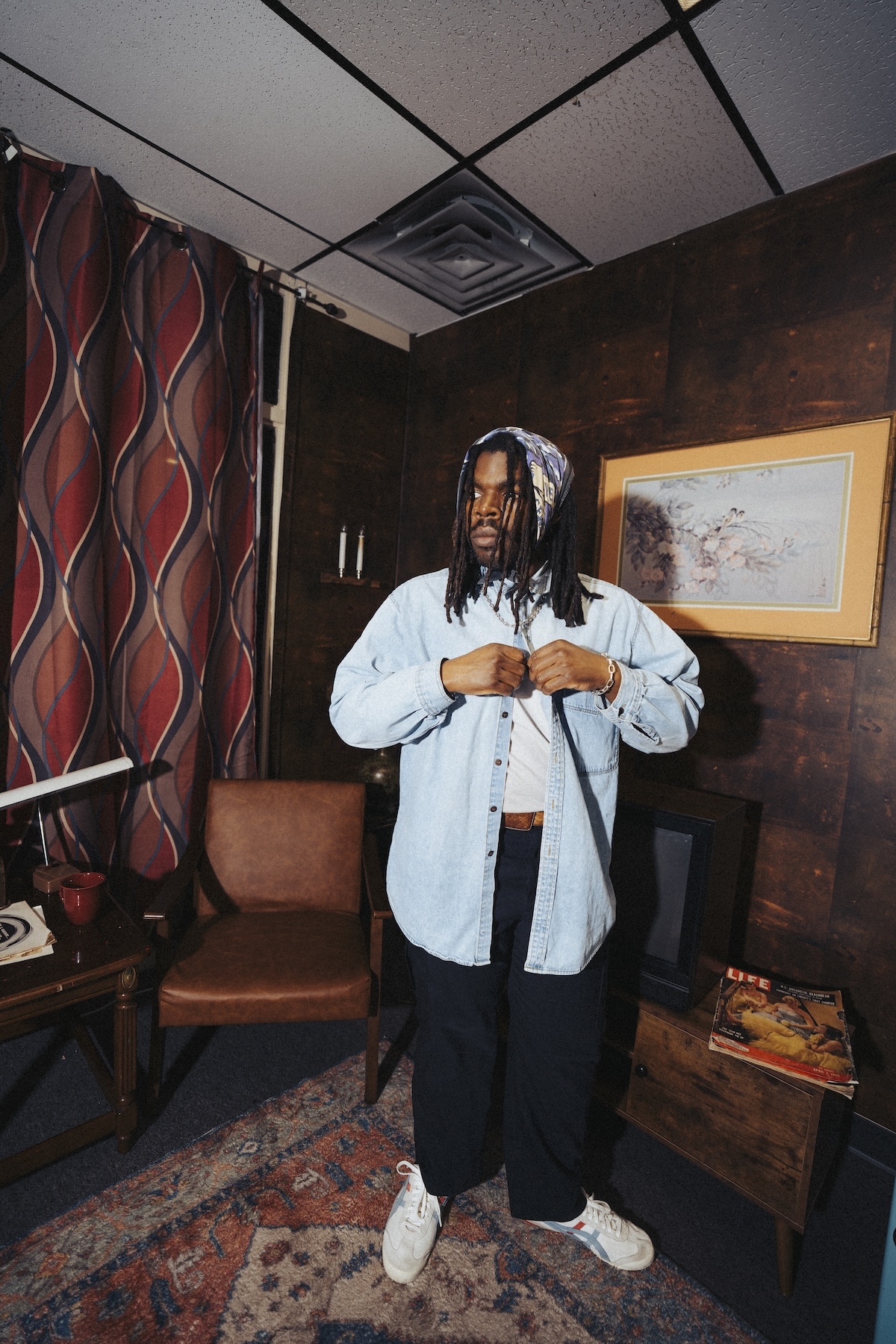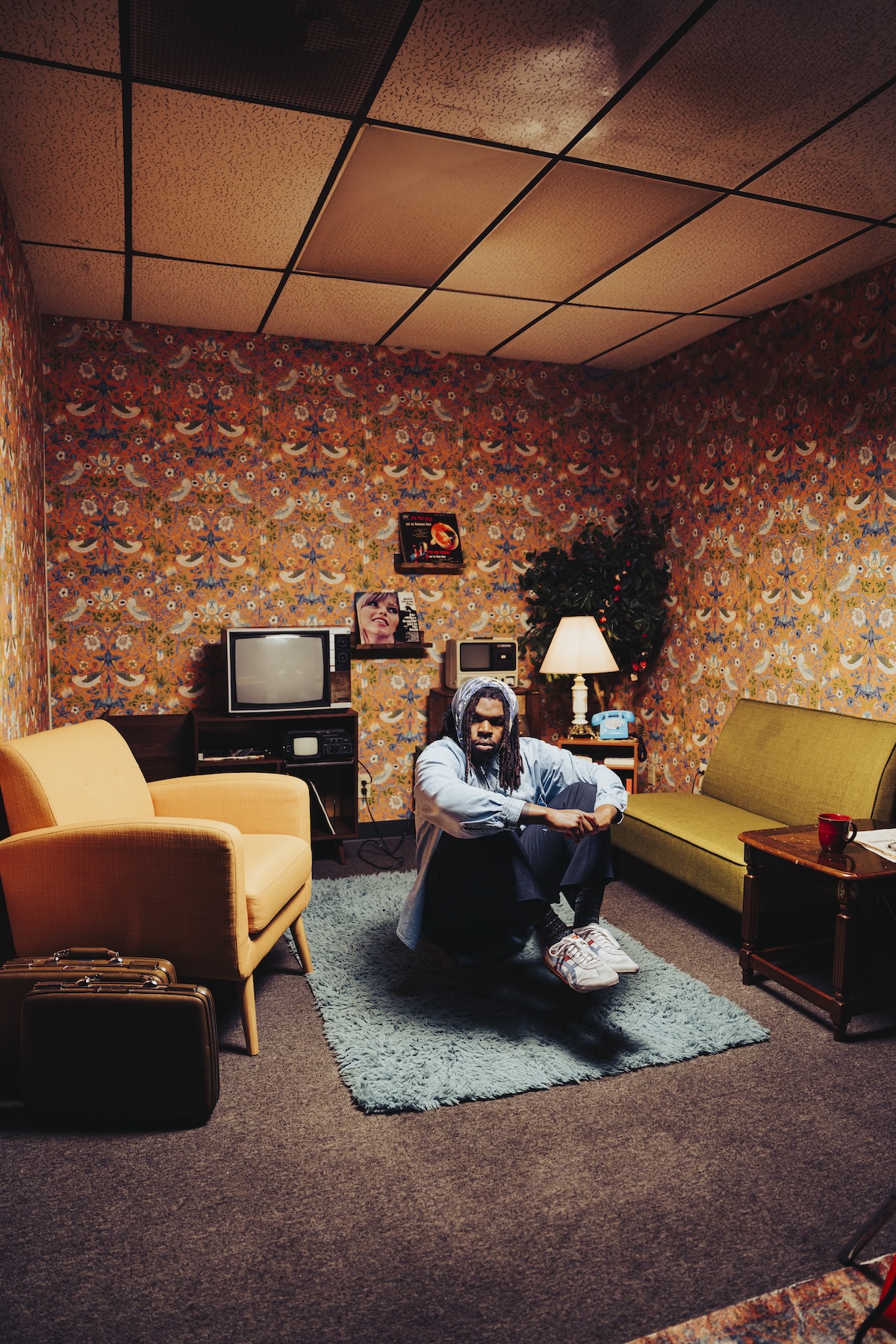As his music suggests, the Canadian experimentalist known as JayWood (real name Jeremy Haywood-Smith) is the type of guy who enjoys thought-provoking conversation about topics like manifestation, astrology, and mysticism—not in a blind follower kind of way, but in a loose and curious, self-reflective way.
He offers glimpses of these ideas throughout his new release Leo Negro, a fiercely funky, brightly introspective record that pops like a warm fire with jazzy instrumental flourishes and head-nodding grooves.
Inspired somewhat by Steve Lacy’s Gemini Rights, and more so by the music he grew up with—from ’60s and ’70s soul artists, to the recently departed D’Angelo, to alternative acts like Gorillaz—the record also brings to mind the sultriest elements of contemporary hip-hop artists like Pharrell and N.E.R.D. or Tyler, the Creator, even as it eschews bombast and bravado for something more gentle and personal. It works as both a vibey background soundtrack from a pair of earbuds and a focused at-home turntable audio-trip.
Smith admits that these days, he’s “intentionally vulnerable” with his sonic expression, offering bits and pieces of his psyche and “woo woo” tendencies. We discover that we’re both Leos, which, if you buy into astrological profiles, means we both like attention, praise, and loyalty. (I mean, who doesn’t?)
Neither of us is hardcore about horoscope life guidance (I don’t even know what my rising is) but we both admit that a lot of supposed Leonine traits are markedly accurate. And in a world of daily chaos and worry, we’re both focusing within right now (sound familiar?). For Smith, this means delving into who he is as an artist and a human—his emotions, his motivations, and his influences, all represented in his latest music.
“When I kind of knew the idea of the album was going to be focused on identity, I was like, ‘Well, what are the two things that, no matter what changes in my life, are absolutely me?’ One is like, I’m a Black guy. I actually can’t change that. Don’t want to change that. And I’m a Leo. I was born on August 3.”

I share that I was born three days later, on August 6—though several years prior—and immediately, our connection deepens, effortlessly and organically. We both agree that this interview is probably “meant to be” and that we’re each going to get something out of it beyond a press clip for him and byline for me.
The singer and multi-instrumentalist shares his love of tarot on his social media regularly (check his saved story highlights on IG under “Leo”) and the cards seem to serve as guideposts to his life and work.
“I think tarot really is an access point of self reflection,” he explains as he pulls a deck out and begins to shuffle it. “It’s like, whatever the cards say. You’re interpreting them however you want to, wherever you need to. It’s also a nice way to just be intentional with time. It’s like, let me just have some magical thinking for a minute. Let me think about something and then ask a question and then receive an answer—it’s very similar to how I write my lyrics.”
The cards have served him well in various ways. If he’s going through a weird time, he just “pings the universe” to see what he should be giving attention to consciously and what he might not realize he’s holding onto subconsciously.

“I’m open to everything—the idea that anything is possible,” he tells me. “You know, we didn’t get raptured recently. It didn’t happen. But I was like, ‘Yeah, maybe that could happen. You never know.”
It’s another thing we have in common. I’ve had my cards read before, and my palm; even some tea leaves once. I don’t really trust psychics, but I have friends who identify as witchy (beyond the goth get-ups) and I believe they do have power. The one thing I am sure of in terms of magic (and spirituality too), is that it exists. I don’t fully understand how it works, but it does for a lot of people in different ways. Whether it’s science and or supernatural, I don’t know, but if it can help us understand ourselves better, why not?
Getting a reading from JayWood, the man whose music I’ve been immersing in lately feels right, even if it’s during an interview about him. So, for a portion of our chat, the tables are turned.
Smith asks me what I’d like to learn about myself and what elements I’d like to focus on as he lays out a three-card spread from his artfully illustrated Mystic Mondays deck. We decide to look at desire, conflict, and resolution as it pertains to my professional life (makes sense considering it’s facilitating this very conversation).

As he turns over each card, we discuss what it might be telling us about my career which is in a “transitional period,” as he correctly calls it. (I recently left a full-time editor position, so I’m freelance writing and looking for what’s next). The cards come up as follows:
Under “desire,” I get The Hanged Woman card, which reminds us to have patience and understand that a “small moment could have a big impact.” (Like this one).
For “conflict, ” I’m given the Ace of Pentacles card, suggesting that opportunities are abundantly available to me (yes!) and that I am planting seeds for further growth (right on).
Finally, for “resolution,” he shows me the Death card, which is not as scary as it sounds. “Usually the Death card means the end of something,” Smith tells me. “Not a life, but death of a way of being.”
I’m having a “very charged pull” apparently, which Smith elaborates on as he talks takeaways.

“Things are going to be different for you right now,” he explains. “You’ll never reach your full potential if you don’t go outside of your comfort zone. Don’t be scared of this process. Change is hard, change is uncomfortable and…” (He starts to laugh.)
“Funny enough, as I just said that, I realized I say it on the record,” he admits. “It’s on a song called “Gratitude.” Toward the end I give myself a pep talk and I talk about this specifically. “
“It’s an opportunity of learning and leaning into a different version of yourself,” he continues, clearly talking about both of us now… maybe all of us. “It’s scary to leave who you are and what you know, but it’s also really exciting.”
Leo Negro was recorded during what could be called a scary time for the Polaris Music Prize-recognized artist, during a move from his hometown in Winnepeg to Montreal. The former mail carrier is clearly priming himself for bigger platforms, more attention, and potential global recognition, and that can be daunting.

But he’s got the goods. Bonafide hooks and dreamy atmospherics, elevated by real instrumentation and sensual samples and beats. Songs like “Pistachios,” “Big Tings” and the album’s closer, “Sun Baby,” highlight the retro cosmic jive of it all, while his thoughtful lyricism keeps each layered listen relatable.
“I get very similar tarot readings to the one that you got here,” he tells me as our time together comes to a close. “I’ve learned to let go of the end results— let go and just do…” It’s a sentiment we both need to hear, it seems, one which will come in particularly useful for JayWood as he prepares for his upcoming tour. “In a time of instant gratification, you want to do something and see the biggest result immediately. But I want to be able to do this sustainably for a long time and enjoy it the whole time I’m doing it. Tarot grounds me and reminds me to let go of the outcome and be in the moment.”



